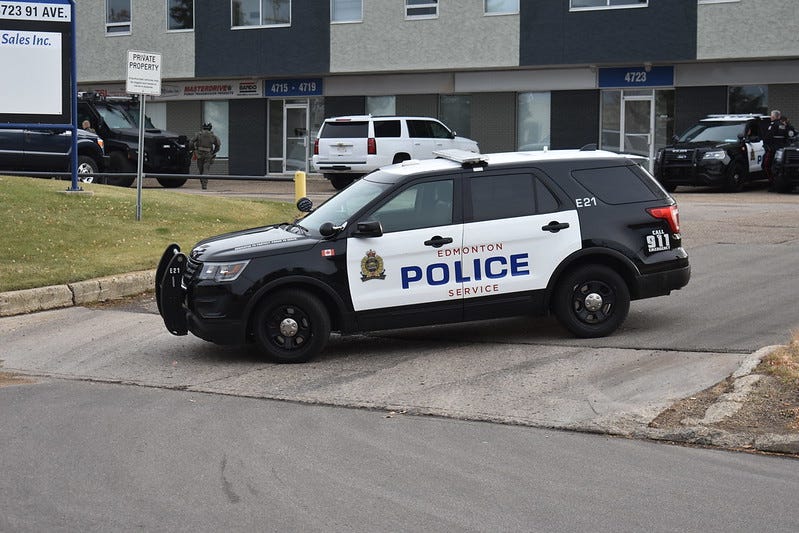Edmonton cops criminalize school kids
New research shows police surveillance of students

A new study reveals that Edmonton’s school resource officer (SRO) program, which brings cops into schools under the guise of community policing, has criminalized thousands of students over the past decade. The Edmonton SRO Research Project is the first study examing the SRO program’s outcomes since its inception 43 years ago.
Contrary to supporters’ claims that the SRO program diverts students away from the criminal justice system, co-authors of the report, Bashir Mohamed and Alexandre Da Costa say this program creates a “school-to-prison pipeline” that disproportionately targets racialized students.
The numbers released show that between 2011 and 2021 student resource officers have laid criminal charges against 2,068 students, and been involved in at least 679 expulsions and 5,228 suspensions.
Additionally, the data shows 20,963 students have been labeled as “offenders” by police officers in the same time period, which the Edmonton Police Service defines as an umbrella term conflating those who have been disciplined for violating bylaws and those who have been charged criminally.
The data was discovered through a simple freedom of information request, which according to Mohamed, speaks not to the incapability of any journalist but how hollowed out the media industry and other public institutions, like school boards, have become in recent years.
“The reason why we have these issues, and the reason why there isn't this oversight, is because these institutions have been gutted,” he said. “School boards feel afraid to flex their power.”
One aspect of the report that went unmentioned in stories from the Edmonton Journal, CityNews and Global News is a specific incident of classroom surveillance that highlights the progam’s abusive nature.
In 2012, an SRO named Const. Hood set up a program to surveil students using a “bait phone” that tracks their movements.
Hood did this because he suspected a student of stealing phones and had insufficient evidence to charge them criminally. But Hood didn’t simply go rogue.
The bait phone program was trialed at Eastglen High School with school administration’s blessing for its explicit goal of delivering “consequences through the judiciary system.”
A particularly disturbing detail is that suspected students were placed in a “dossier” — the word used in standard operating procedure documents — before the bait phone was planted.
“It's straight up proof from their own operating documents that the story of diversion, the story of community policing, is a lie,” said Mohamed, who was recently revealed to have been on a list of Edmonton Police Service critics.
In September 2020, the SRO program was suspended in Edmonton public schools pending a review of its funding, data collection and outcomes, thanks in no small part to the efforts of former Edmonton Public School Board (EPSB) trustee Bridget Stirling, who served from 2015-2021. (Disclosure: Stirling is an Orchard subscriber.)
Stirling requested the review in light of growing discourse about racism after the George Floyd murder in the summer of 2020, and successfully urged her EPSB colleagues to halt the program during the review process.
But she told me she has conflicted feelings in response to the data that was released. “In one way, I feel some vindication in that what I suspected about the program's role in criminalizing youth was correct, but I also feel a sense of sadness and responsibility for the harm that was done in the five years I didn't act,” she said.
“In that time, thousands of children's lives were negatively affected by the program, either through criminalization or through the experience of surveillance and racism that many students have described in dealing with their school's SRO.”
Stirling expressed frustration that when she asked for this data in 2020, police told her it simply didn’t exist.
Stirling’s full post on Medium reflecting on the SRO program is very much worth reading in full.
Read the full Edmonton SRO Research Project report here.
In other news …
UCP changes leadership review plans
The UCP executive has decided to cancel Premier Jason Kenney’s in-person leadership review in Red Deer scheduled for April 9, opting instead for mail-in ballots and a virtual event.
This comes after the party announced it had 15,000 people signed up as members — way more than the 3,000 expected — about half of whom registered in the past four months.
Given Kenney’s recent leadership campaign history, it’s reasonable to wonder how many of those registered are aware of their registration.
University of Lethbridge faculty strike ends
Students at U of L are back in classes today after faculty association members ratified a new contract with 91% support following almost six weeks on the picket lines.
The agreement includes a 3.5% pay increase for faculty members and academic assistants over its four-year duration.
University of Lethbridge Faculty Association president Dan O’Donnell lambasted “truly extreme meddling in the negotiating process” from the UCP government.
Edited by Ximena González

